Reflective Essay: Kolb's Model, Key Behaviors, and Action Planning
VerifiedAdded on 2023/06/18
|6
|1090
|93
Essay
AI Summary
This essay reflects on learning experiences, utilizing Kolb's reflective model to analyze a group assignment focused on organizational behavior, specifically within Nike. The reflection covers the concrete experience of the assignment, observations regarding communication challenges, abstract conceptualization of improvements, and active experimentation for future tasks. Key behaviors such as collaboration, courage to challenge, and role modeling are examined, with a focus on the individual's role as a team leader and its impact on team motivation and project success. The essay concludes with an action plan for future development, emphasizing improved communication skills and critical thinking abilities to enhance creativity and overall performance in group settings. Desklib offers a range of study tools and resources for students seeking similar reflective essays and academic support.
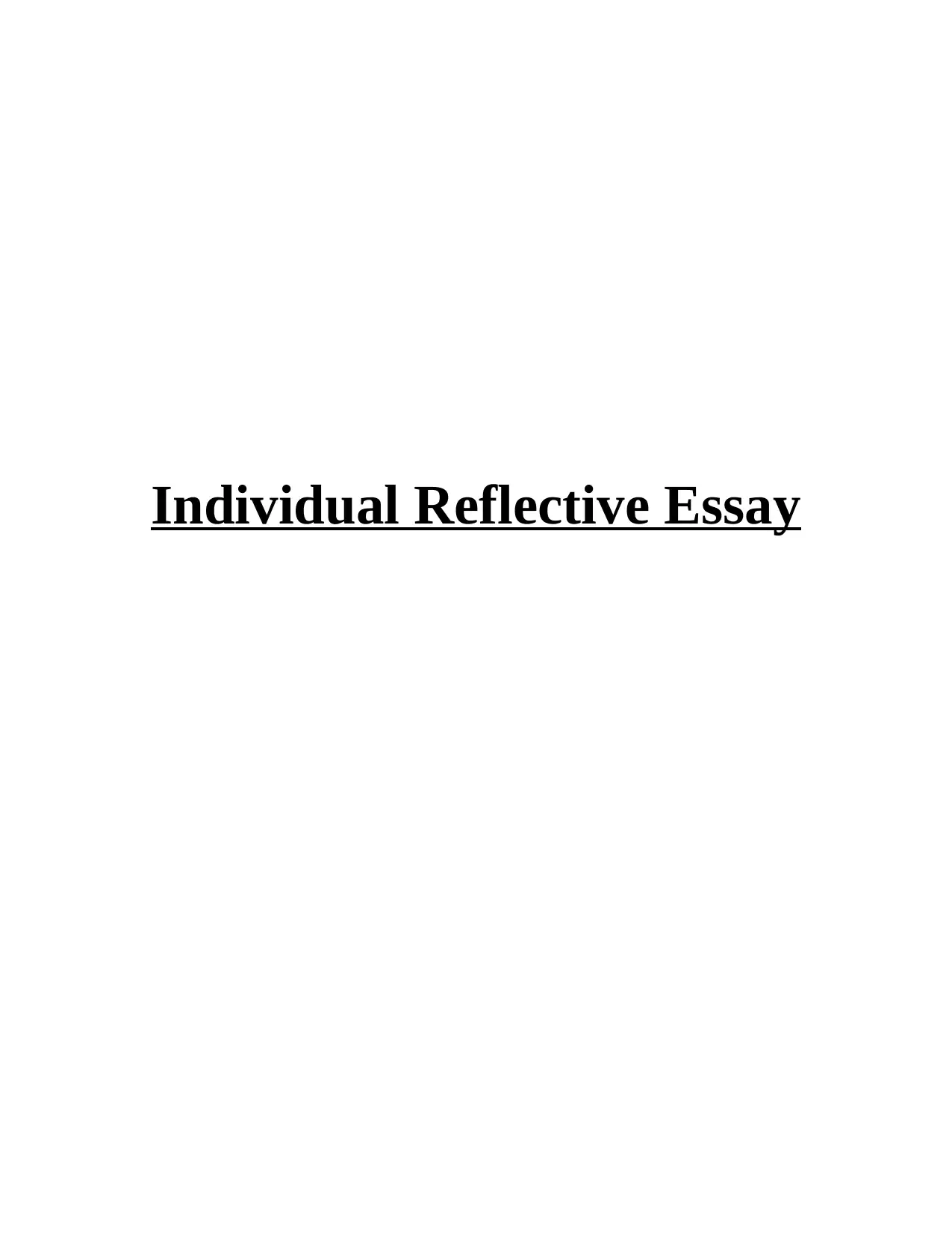
Individual Reflective Essay
Paraphrase This Document
Need a fresh take? Get an instant paraphrase of this document with our AI Paraphraser
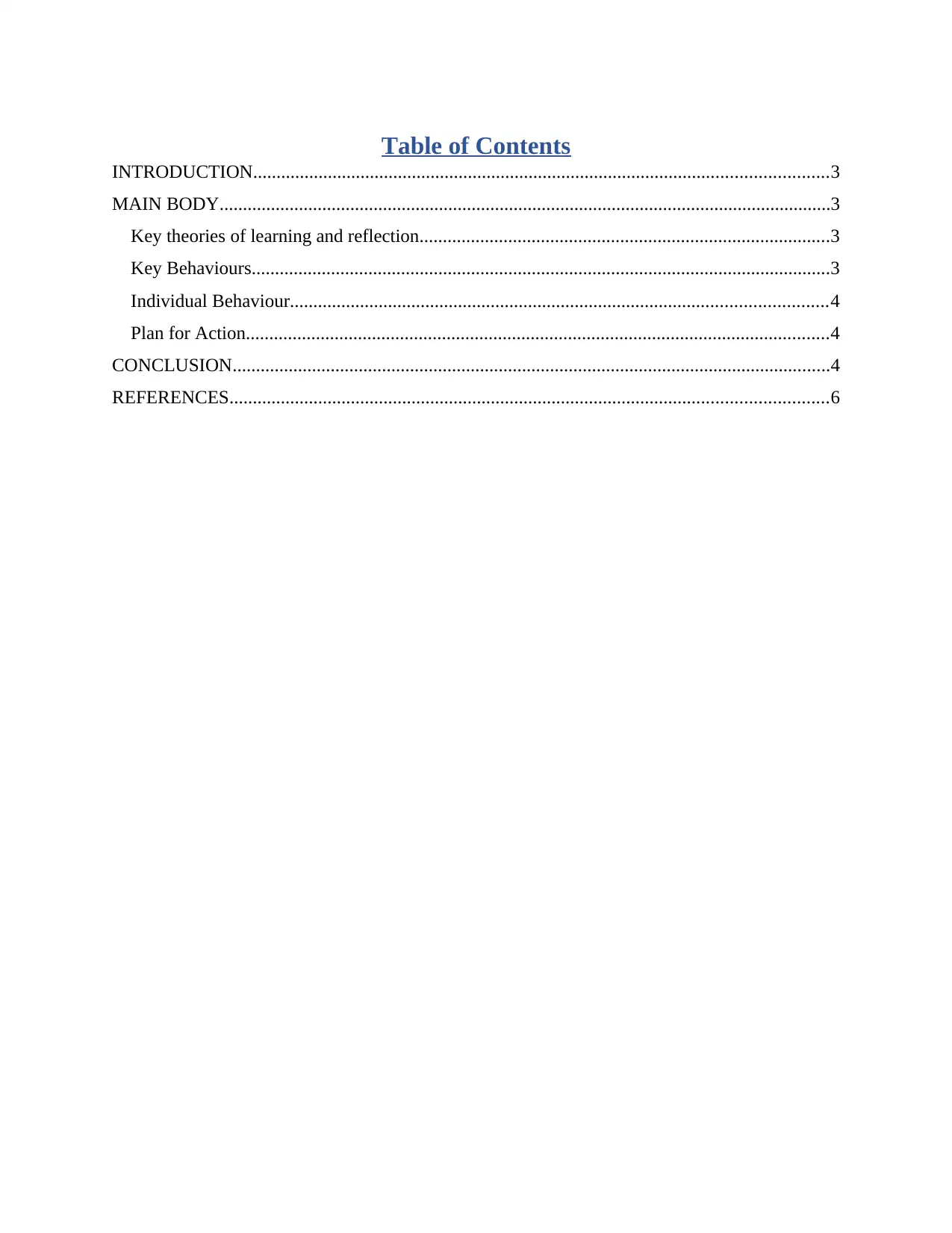
Table of Contents
INTRODUCTION...........................................................................................................................3
MAIN BODY...................................................................................................................................3
Key theories of learning and reflection........................................................................................3
Key Behaviours............................................................................................................................3
Individual Behaviour...................................................................................................................4
Plan for Action.............................................................................................................................4
CONCLUSION................................................................................................................................4
REFERENCES................................................................................................................................6
INTRODUCTION...........................................................................................................................3
MAIN BODY...................................................................................................................................3
Key theories of learning and reflection........................................................................................3
Key Behaviours............................................................................................................................3
Individual Behaviour...................................................................................................................4
Plan for Action.............................................................................................................................4
CONCLUSION................................................................................................................................4
REFERENCES................................................................................................................................6
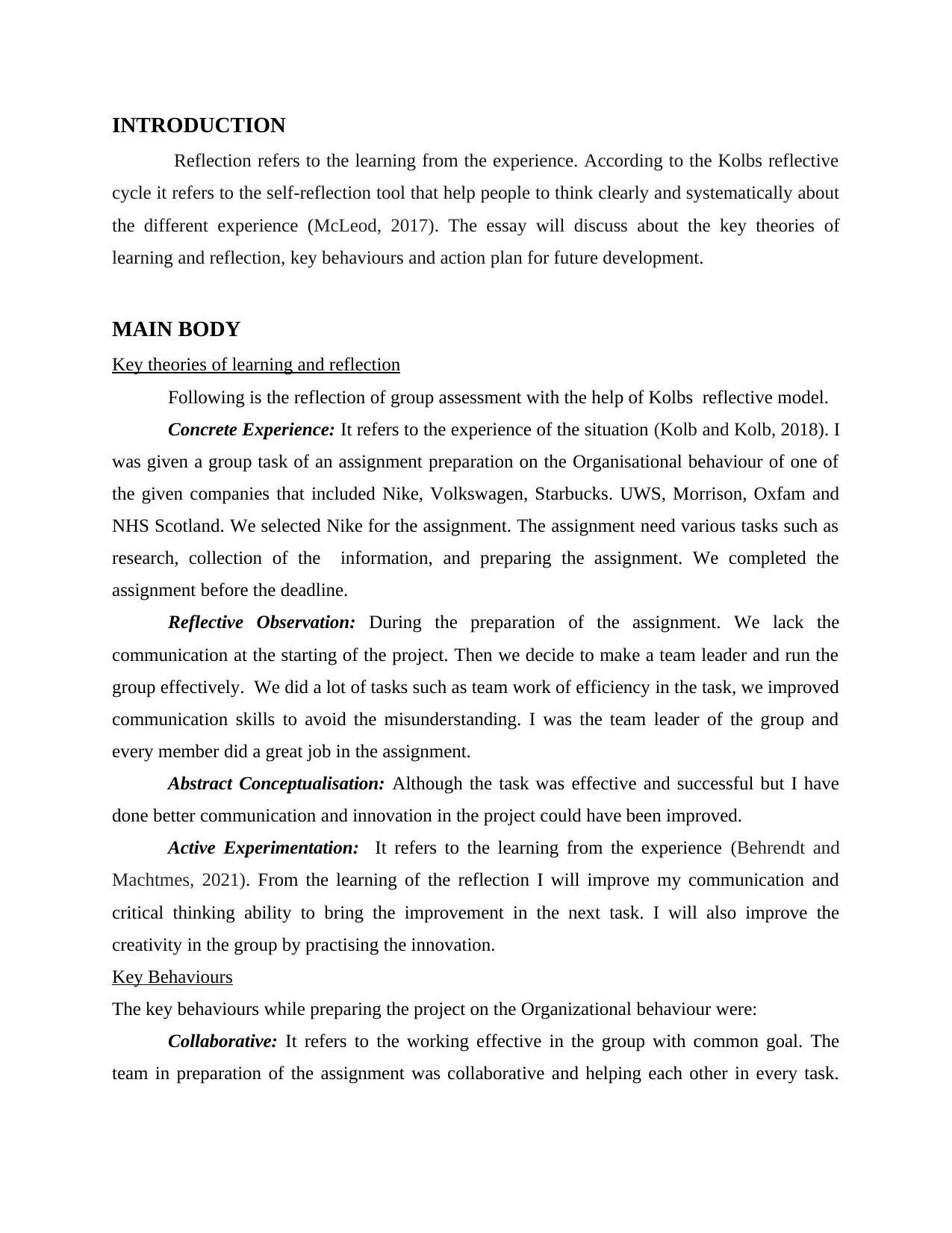
INTRODUCTION
Reflection refers to the learning from the experience. According to the Kolbs reflective
cycle it refers to the self-reflection tool that help people to think clearly and systematically about
the different experience (McLeod, 2017). The essay will discuss about the key theories of
learning and reflection, key behaviours and action plan for future development.
MAIN BODY
Key theories of learning and reflection
Following is the reflection of group assessment with the help of Kolbs reflective model.
Concrete Experience: It refers to the experience of the situation (Kolb and Kolb, 2018). I
was given a group task of an assignment preparation on the Organisational behaviour of one of
the given companies that included Nike, Volkswagen, Starbucks. UWS, Morrison, Oxfam and
NHS Scotland. We selected Nike for the assignment. The assignment need various tasks such as
research, collection of the information, and preparing the assignment. We completed the
assignment before the deadline.
Reflective Observation: During the preparation of the assignment. We lack the
communication at the starting of the project. Then we decide to make a team leader and run the
group effectively. We did a lot of tasks such as team work of efficiency in the task, we improved
communication skills to avoid the misunderstanding. I was the team leader of the group and
every member did a great job in the assignment.
Abstract Conceptualisation: Although the task was effective and successful but I have
done better communication and innovation in the project could have been improved.
Active Experimentation: It refers to the learning from the experience (Behrendt and
Machtmes, 2021). From the learning of the reflection I will improve my communication and
critical thinking ability to bring the improvement in the next task. I will also improve the
creativity in the group by practising the innovation.
Key Behaviours
The key behaviours while preparing the project on the Organizational behaviour were:
Collaborative: It refers to the working effective in the group with common goal. The
team in preparation of the assignment was collaborative and helping each other in every task.
Reflection refers to the learning from the experience. According to the Kolbs reflective
cycle it refers to the self-reflection tool that help people to think clearly and systematically about
the different experience (McLeod, 2017). The essay will discuss about the key theories of
learning and reflection, key behaviours and action plan for future development.
MAIN BODY
Key theories of learning and reflection
Following is the reflection of group assessment with the help of Kolbs reflective model.
Concrete Experience: It refers to the experience of the situation (Kolb and Kolb, 2018). I
was given a group task of an assignment preparation on the Organisational behaviour of one of
the given companies that included Nike, Volkswagen, Starbucks. UWS, Morrison, Oxfam and
NHS Scotland. We selected Nike for the assignment. The assignment need various tasks such as
research, collection of the information, and preparing the assignment. We completed the
assignment before the deadline.
Reflective Observation: During the preparation of the assignment. We lack the
communication at the starting of the project. Then we decide to make a team leader and run the
group effectively. We did a lot of tasks such as team work of efficiency in the task, we improved
communication skills to avoid the misunderstanding. I was the team leader of the group and
every member did a great job in the assignment.
Abstract Conceptualisation: Although the task was effective and successful but I have
done better communication and innovation in the project could have been improved.
Active Experimentation: It refers to the learning from the experience (Behrendt and
Machtmes, 2021). From the learning of the reflection I will improve my communication and
critical thinking ability to bring the improvement in the next task. I will also improve the
creativity in the group by practising the innovation.
Key Behaviours
The key behaviours while preparing the project on the Organizational behaviour were:
Collaborative: It refers to the working effective in the group with common goal. The
team in preparation of the assignment was collaborative and helping each other in every task.
⊘ This is a preview!⊘
Do you want full access?
Subscribe today to unlock all pages.

Trusted by 1+ million students worldwide
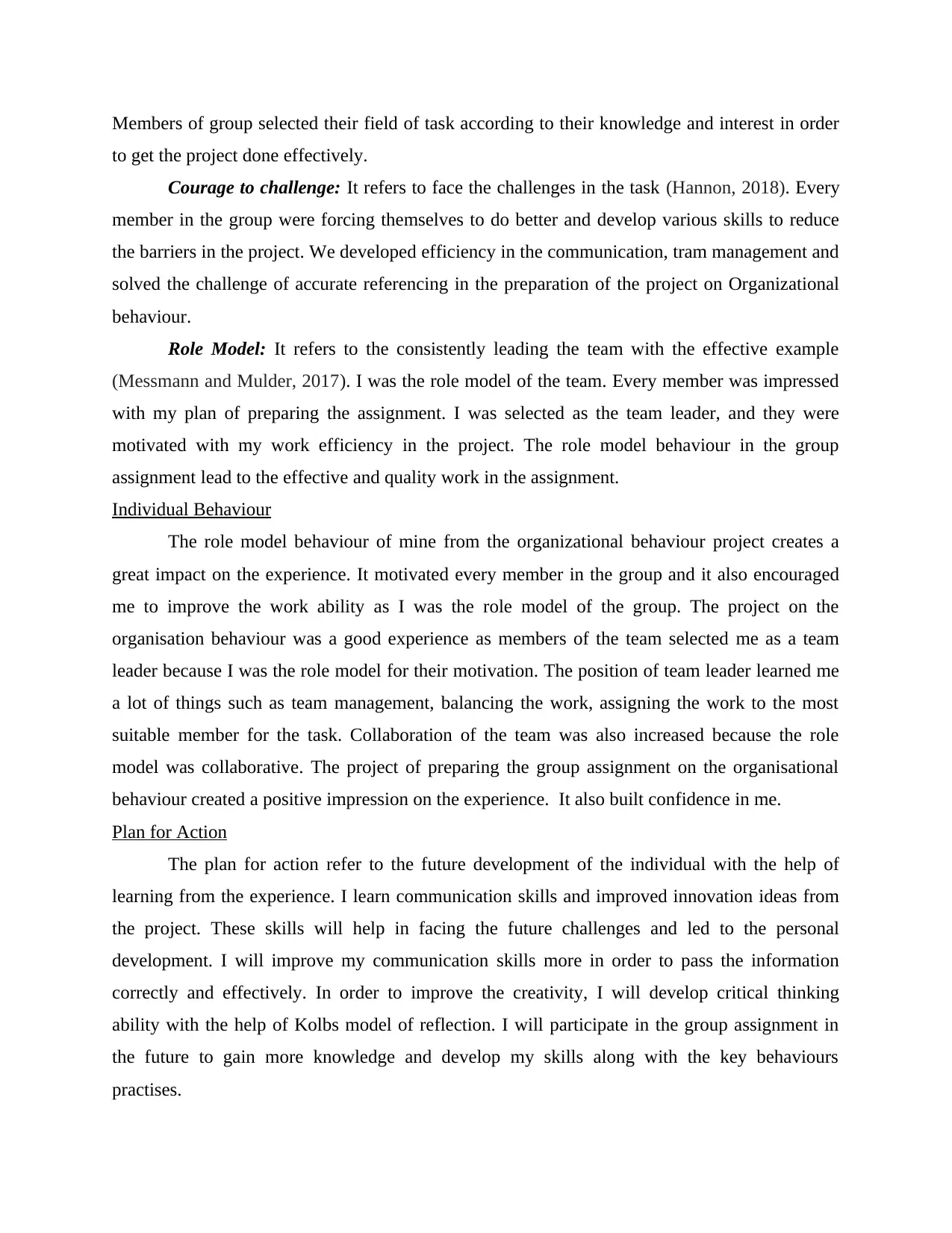
Members of group selected their field of task according to their knowledge and interest in order
to get the project done effectively.
Courage to challenge: It refers to face the challenges in the task (Hannon, 2018). Every
member in the group were forcing themselves to do better and develop various skills to reduce
the barriers in the project. We developed efficiency in the communication, tram management and
solved the challenge of accurate referencing in the preparation of the project on Organizational
behaviour.
Role Model: It refers to the consistently leading the team with the effective example
(Messmann and Mulder, 2017). I was the role model of the team. Every member was impressed
with my plan of preparing the assignment. I was selected as the team leader, and they were
motivated with my work efficiency in the project. The role model behaviour in the group
assignment lead to the effective and quality work in the assignment.
Individual Behaviour
The role model behaviour of mine from the organizational behaviour project creates a
great impact on the experience. It motivated every member in the group and it also encouraged
me to improve the work ability as I was the role model of the group. The project on the
organisation behaviour was a good experience as members of the team selected me as a team
leader because I was the role model for their motivation. The position of team leader learned me
a lot of things such as team management, balancing the work, assigning the work to the most
suitable member for the task. Collaboration of the team was also increased because the role
model was collaborative. The project of preparing the group assignment on the organisational
behaviour created a positive impression on the experience. It also built confidence in me.
Plan for Action
The plan for action refer to the future development of the individual with the help of
learning from the experience. I learn communication skills and improved innovation ideas from
the project. These skills will help in facing the future challenges and led to the personal
development. I will improve my communication skills more in order to pass the information
correctly and effectively. In order to improve the creativity, I will develop critical thinking
ability with the help of Kolbs model of reflection. I will participate in the group assignment in
the future to gain more knowledge and develop my skills along with the key behaviours
practises.
to get the project done effectively.
Courage to challenge: It refers to face the challenges in the task (Hannon, 2018). Every
member in the group were forcing themselves to do better and develop various skills to reduce
the barriers in the project. We developed efficiency in the communication, tram management and
solved the challenge of accurate referencing in the preparation of the project on Organizational
behaviour.
Role Model: It refers to the consistently leading the team with the effective example
(Messmann and Mulder, 2017). I was the role model of the team. Every member was impressed
with my plan of preparing the assignment. I was selected as the team leader, and they were
motivated with my work efficiency in the project. The role model behaviour in the group
assignment lead to the effective and quality work in the assignment.
Individual Behaviour
The role model behaviour of mine from the organizational behaviour project creates a
great impact on the experience. It motivated every member in the group and it also encouraged
me to improve the work ability as I was the role model of the group. The project on the
organisation behaviour was a good experience as members of the team selected me as a team
leader because I was the role model for their motivation. The position of team leader learned me
a lot of things such as team management, balancing the work, assigning the work to the most
suitable member for the task. Collaboration of the team was also increased because the role
model was collaborative. The project of preparing the group assignment on the organisational
behaviour created a positive impression on the experience. It also built confidence in me.
Plan for Action
The plan for action refer to the future development of the individual with the help of
learning from the experience. I learn communication skills and improved innovation ideas from
the project. These skills will help in facing the future challenges and led to the personal
development. I will improve my communication skills more in order to pass the information
correctly and effectively. In order to improve the creativity, I will develop critical thinking
ability with the help of Kolbs model of reflection. I will participate in the group assignment in
the future to gain more knowledge and develop my skills along with the key behaviours
practises.
Paraphrase This Document
Need a fresh take? Get an instant paraphrase of this document with our AI Paraphraser
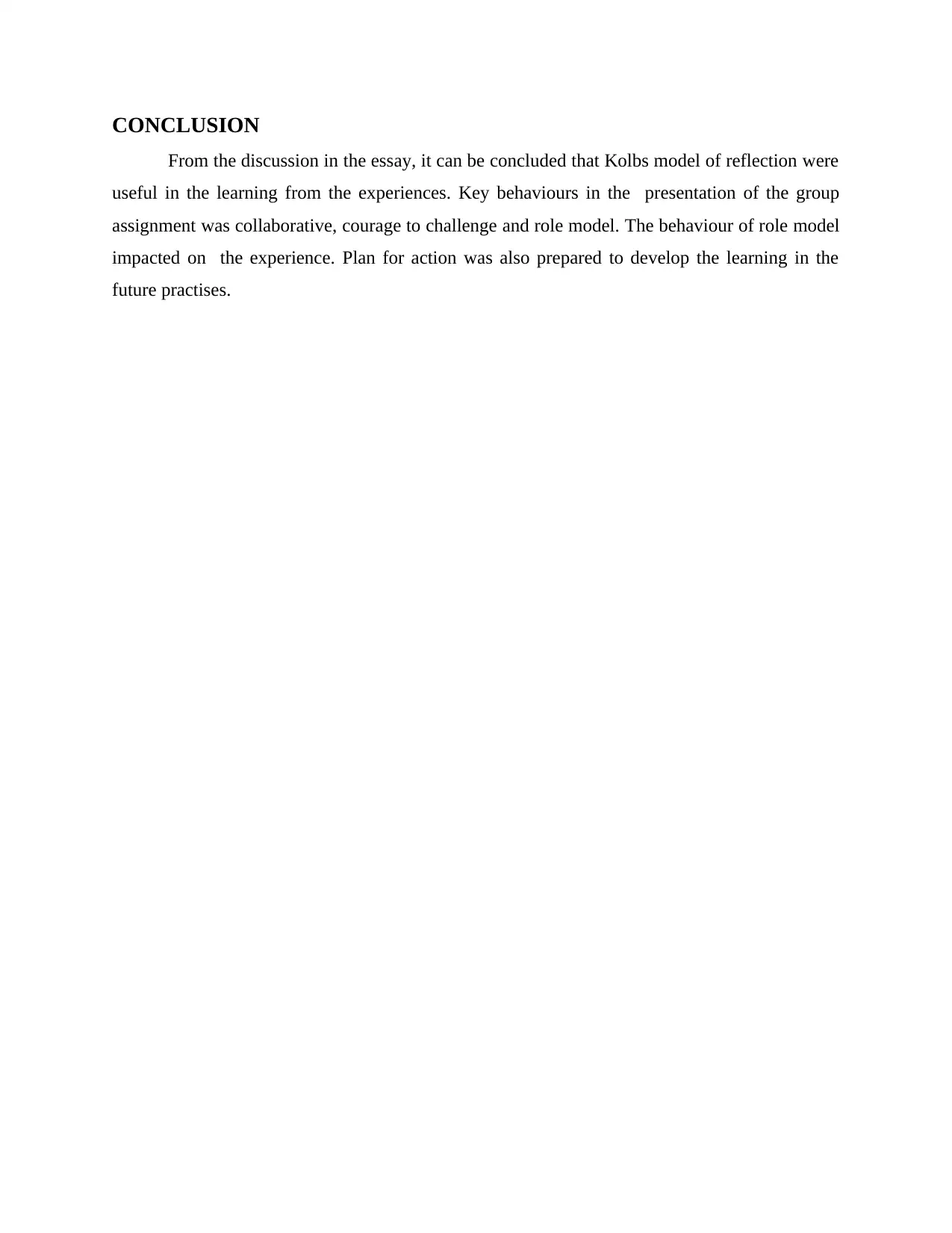
CONCLUSION
From the discussion in the essay, it can be concluded that Kolbs model of reflection were
useful in the learning from the experiences. Key behaviours in the presentation of the group
assignment was collaborative, courage to challenge and role model. The behaviour of role model
impacted on the experience. Plan for action was also prepared to develop the learning in the
future practises.
From the discussion in the essay, it can be concluded that Kolbs model of reflection were
useful in the learning from the experiences. Key behaviours in the presentation of the group
assignment was collaborative, courage to challenge and role model. The behaviour of role model
impacted on the experience. Plan for action was also prepared to develop the learning in the
future practises.
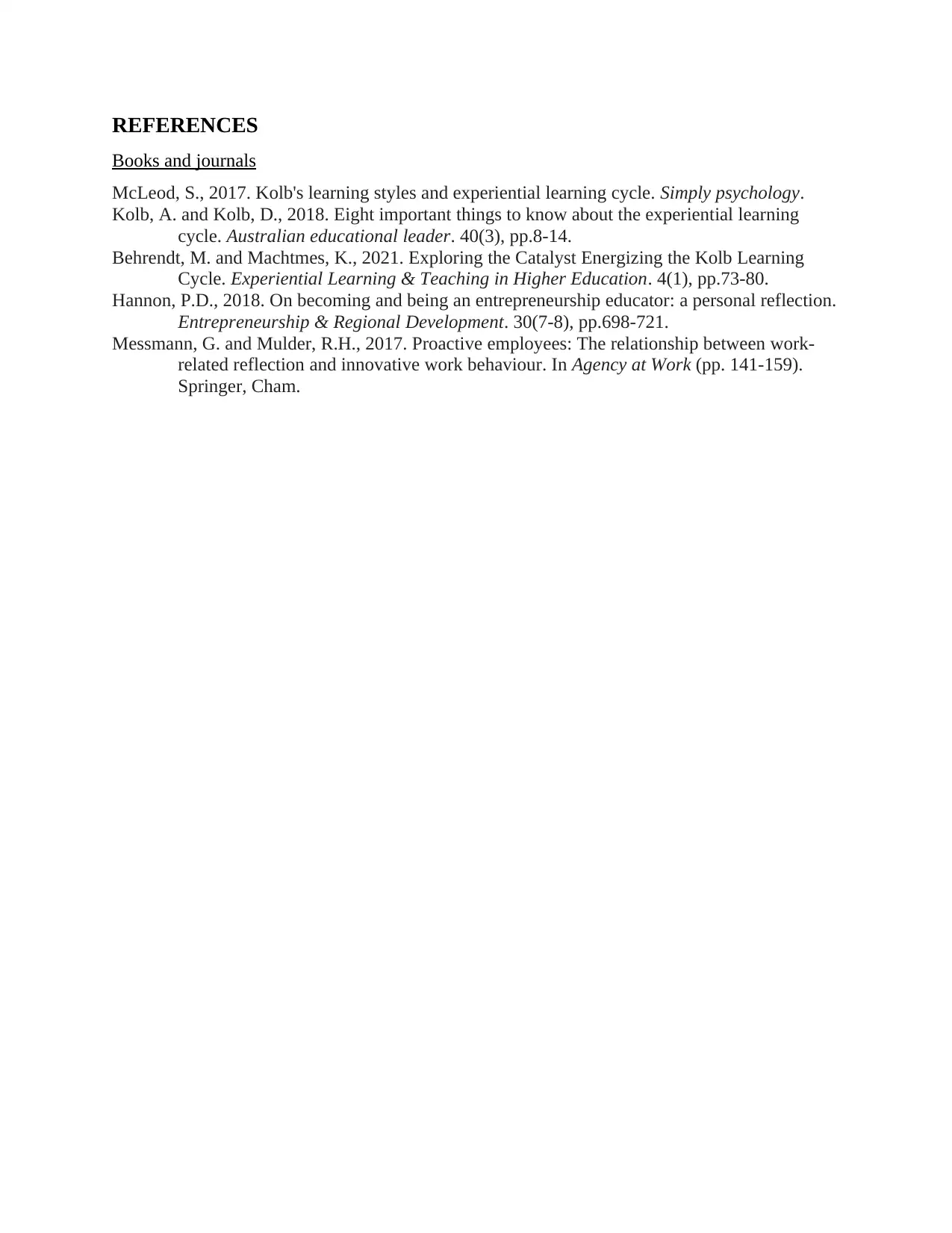
REFERENCES
Books and journals
McLeod, S., 2017. Kolb's learning styles and experiential learning cycle. Simply psychology.
Kolb, A. and Kolb, D., 2018. Eight important things to know about the experiential learning
cycle. Australian educational leader. 40(3), pp.8-14.
Behrendt, M. and Machtmes, K., 2021. Exploring the Catalyst Energizing the Kolb Learning
Cycle. Experiential Learning & Teaching in Higher Education. 4(1), pp.73-80.
Hannon, P.D., 2018. On becoming and being an entrepreneurship educator: a personal reflection.
Entrepreneurship & Regional Development. 30(7-8), pp.698-721.
Messmann, G. and Mulder, R.H., 2017. Proactive employees: The relationship between work-
related reflection and innovative work behaviour. In Agency at Work (pp. 141-159).
Springer, Cham.
Books and journals
McLeod, S., 2017. Kolb's learning styles and experiential learning cycle. Simply psychology.
Kolb, A. and Kolb, D., 2018. Eight important things to know about the experiential learning
cycle. Australian educational leader. 40(3), pp.8-14.
Behrendt, M. and Machtmes, K., 2021. Exploring the Catalyst Energizing the Kolb Learning
Cycle. Experiential Learning & Teaching in Higher Education. 4(1), pp.73-80.
Hannon, P.D., 2018. On becoming and being an entrepreneurship educator: a personal reflection.
Entrepreneurship & Regional Development. 30(7-8), pp.698-721.
Messmann, G. and Mulder, R.H., 2017. Proactive employees: The relationship between work-
related reflection and innovative work behaviour. In Agency at Work (pp. 141-159).
Springer, Cham.
⊘ This is a preview!⊘
Do you want full access?
Subscribe today to unlock all pages.

Trusted by 1+ million students worldwide
1 out of 6
Related Documents
Your All-in-One AI-Powered Toolkit for Academic Success.
+13062052269
info@desklib.com
Available 24*7 on WhatsApp / Email
![[object Object]](/_next/static/media/star-bottom.7253800d.svg)
Unlock your academic potential
Copyright © 2020–2026 A2Z Services. All Rights Reserved. Developed and managed by ZUCOL.





